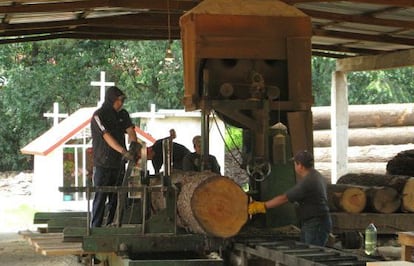Mexico fights for its forests
Communities are embracing sustainable wood production, but illegal logging continues


Eight containers filled with cedar, mahogany, and passion fruit tree wood arrive in China. The cargo came across the Pacific Ocean from the port of Manzanillo in Colima state, western Mexico, but its journey started in the leafy forests of Michoacán. The precious woods, ready to become expensive furniture, are carrying falsified government certificates – it is just one of the ways that illegal loggers and wood traffickers are commercializing the country’s forests.
Seventeen percent – 141 million hectares – of Mexico’s territory is forest land. The country has the 11th largest total area of forest land in the world. Pine and oak trees abound on its mountains, especially in the northern states of Chihuahua and Durango. But these species can also be found in the interior and in the south. Protecting them has been no small feat. In the 1980s, the government found a formula that is now yielding results: conserve forests while producing wood.
In Agua Bendita in Amanalco, Mexico state, 125 kilometers from Mexico City, local commissioner Manuel Colín remembers when the federal government proposed the Sustainable Forestry Development Program 30 years ago. The authorities gave residents 1,350 hectares to cultivate and produce wood while they took up conservation projects. “Now the forest is very thick and we appreciate it because we live off of it,” Colín says.
Mexico is the country with the 11th largest total area of forest land in the world
Wood from Agua Bendita sold in Mexico City brings $1.6 million in to the community every year. The Secretariat of Environment and Natural Resources (Semarnat) said the conservation-production model satisfies one third of the domestic demand for wood. Wood production contributes 1.8 percent of the country’s gross domestic product. “It is a very conservative method,” says Gabino García, a forest technician from Agua Bendita. “Maybe it’s not the most productive but we are growing the forest back.” Ancient and new trees living side by side on this land prevent erosion while locals protect the area from plagues and illegal wood cutters.
Agua Bendita has pushed out illegal logging. “The forest is the goose that lays the golden eggs and people will not allow anyone to come and steal them,” García says of the locals who work as wood producers and serve as forest rangers.
It is a very conservative method. It’s not the most productive but we are growing the forest back
Gabino García, forest technician
The situation is very different in the nearby state of Michoacán and in the mountains of Puebla. Illegal wood production and constant attacks by criminal organizations have prevented locals from carrying out conservation projects. “There are entire communities in Michoacán who cannot enter whole areas of their common lands because organized crime groups have invaded them and imposed a fee,” says Eugenio Fernández, spokesman for the sustainable forestry organization, Consejo Civil Mexicano para la Silvicultura Sostenible.
Organizations that monitor the forestry industry have not been able to record all the illegal activities in wood production – from clandestine felling to “timber laundering” and illegal transport. “Depending on the region and the area in question, illegal logging is estimated to be between 25 and 55 percent of production,” says Francisco García, director general of forestry management at Semarnat. García notes that Michoacán’s case is “atypical” and the government is now monitoring illegal felling there as part of its strategy to take back the entire region from the drug cartels.
Without internet or invoices
Officials trust that wood production will continue to grow as it has since 2011 while local communities consolidate forestry programs and beat back illegal logging. Locals, however, see friendly fire: government paperwork and over-regulation.
Getting or renewing a permit is such a long process that many find themselves unable to work in production or conservation. And the 2013 fiscal reforms require producers to issue electronic invoices and handle business online when some communities in Agua Bendita do not even have a landline.
“As a country, we are implementing excessive regulation,” says Eugenio Fernández. “We are imposing a tax burden that is much higher than what a city producer pays or what a forest producer pays on the international market. We are preventing forest communities from developing while illegal loggers – the enemies of those communities – grow.”
Producers continue to handle business on paper and they still meet with forestry officials in person. The Mexican government keeps delivering paperwork online to promote internet use in these communities. “The reality is showing us that not everyone is ready to adopt this modern practice, but we want to look forward and give citizens the option of doing business the traditional way and electronically so that they will have access to the technology,” says Francisco García.
Technology or no technology, Mexican forests remain under the watchful eyes of their owners.
Translation: Dyane Jean François
Tu suscripción se está usando en otro dispositivo
¿Quieres añadir otro usuario a tu suscripción?
Si continúas leyendo en este dispositivo, no se podrá leer en el otro.
FlechaTu suscripción se está usando en otro dispositivo y solo puedes acceder a EL PAÍS desde un dispositivo a la vez.
Si quieres compartir tu cuenta, cambia tu suscripción a la modalidad Premium, así podrás añadir otro usuario. Cada uno accederá con su propia cuenta de email, lo que os permitirá personalizar vuestra experiencia en EL PAÍS.
¿Tienes una suscripción de empresa? Accede aquí para contratar más cuentas.
En el caso de no saber quién está usando tu cuenta, te recomendamos cambiar tu contraseña aquí.
Si decides continuar compartiendo tu cuenta, este mensaje se mostrará en tu dispositivo y en el de la otra persona que está usando tu cuenta de forma indefinida, afectando a tu experiencia de lectura. Puedes consultar aquí los términos y condiciones de la suscripción digital.








































